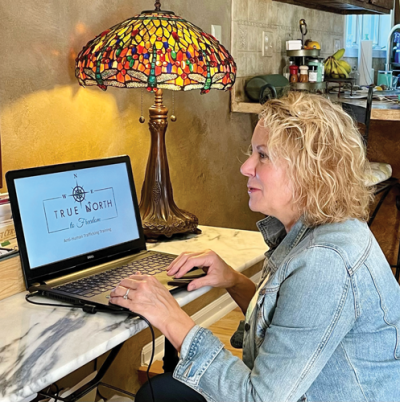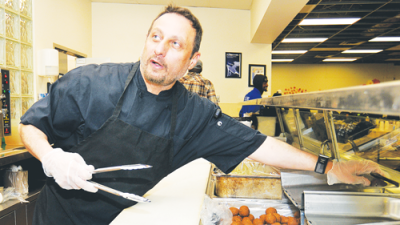
Heidi Wilt, the executive director of True North to Freedom, assists survivors of human trafficking with resources like counseling, applying for government assistance, searching for jobs, limited financial and physical support with accountability; and more.
Photo provided by True North to Freedom
STERLING HEIGHTS — A form of modern-day slavery, human trafficking ensnares people from all walks of life. Sadly, their hardships aren’t over once they’re free.
That’s where groups like True North to Freedom make a difference. The Sterling Heights nonprofit helps survivors rebuild their lives.
This can mean overcoming trauma, finding work and shelter, and staying sober — drugs being one way that traffickers control their victims. TNTF helps survivors turn things around by offering counseling and other services, as well as limited financial support.
Officials say the odds are stacked against survivors.
“There’s a lack of understanding of human trafficking. Not knowing what to look for allows this crime to exist all around us, right under our noses. Awareness training is paramount,” said Heidi Wilt, TNTF’s executive director. “Our criminal justice systems are overwhelmed. Their hands are often tied when it comes to prosecuting and keeping perpetrators in jail.”
She explained that the trauma felt by survivors makes it difficult to testify.
“Victims still carry the brunt of the criminal consequences,” Wilt said.
‘The survivors face many challenges’
There are nearly 27.6 million human trafficking victims globally, according to a 2023 report by the U.S. Department of State. Of those, an estimated 6.3 million are in forced sexual exploitation.
“Human trafficking is one of the most profitable crimes, so we have involvement from the top of governments all the way down in societies around the world,” Wilt said.
The U.S. is no exception, with an estimated 1.1 million survivors and counting. In Michigan, some traffickers use the Great Lakes as clandestine channels for transporting victims between locations in the U.S. and Canada.
As for how victims end up in this predicament, traffickers often groom them on social media and employ tactics ranging from blackmail and drugs to verbal and physical abuse.
Traffickers will limit the victim’s access to communication devices, cutting them off from family and friends. They also tightly control their finances and schedules. Some victims are especially vulnerable due to mental or physical disabilities.
“Force, fraud and coercion are always present in human trafficking,” Wilt said. “The survivors face many challenges. Many have felonies on their records for drug use, prostitution and other offenses due to being trafficked. They’re missing documents like birth certificates, Social Security and driver’s licenses. Many have children — some with their traffickers — and that complicates getting free from their control.”
The way forward
TNTF started humbly enough in 2015 as a prayer group that later evolved into an organization called the Alabaster Gift, and from there rebranded to its current name in 2021.
But the foundational beliefs remain the same.
“Every life has value,” Wilt said. “We’re called to love, nurture and care for each other as unique and beautiful individuals. Everyone has the basic right to live a life of freedom.”
She said the name “True North to Freedom” draws upon their Christian faith, as well as America’s sad history of slavery.
“Jesus is our true north,” Wilt said. “The bondage we’re helping these survivors escape is not just physical or financial, but ultimately to discover their worth. We give them the ability to successfully navigate life in society today.
“The problem is that society promotes the exploitation of men, women and children for profit, with no regard for their innate worth as God’s image bearers,” she said. “We’re committed to nurturing those who were previously involved in sexual or labor exploitation. We’ve become a safe space for those vulnerable people to feel loved, accepted and valued.”
It’s also the beginning of their recovery. TNTF helps survivors apply for governmental aid, find jobs and write résumés, and create household budgets. The group provides emotional support and spiritual guidance, as well as limited financial and physical support with accountability.
There are also life skills classes, survivor-led classes and expressive arts, as well as referrals for counseling through Community Mental Health and others.
“Case management includes all the areas they need to work on, each with their own goals,” Wilt said. “We’re not limited to one area of need. We recognize not everyone fits into the same box.”
Making a difference
Wilt provided testimony by a number of clients, using aliases to protect their identities.
One survivor, Claire, described the despair she once felt.
“The hopelessness is so profound that we think the only way out is to die,” she said. “But there is a glimmer of hope, where someone sees our efforts to survive, (like TNTF), and encourages us to take another step. I can finally live a real life — I am extremely grateful!”
Another survivor, Sara, said TNTF gave her family an opportunity to start over.
“They give me a sense of community and wonderful, spiritual fellowship. I’ve received numerous resources, so that my children and I can meet our basic needs, and we can thrive … (with) things like budgeting, groceries, exceptional therapy and prayer,” Sara said. “The mentoring and guidance I received led me to accomplishments such as a new home and vehicle.”
Carrie said TNTF helped her after enduring 13 months of sex trafficking.
“The Bible-based therapy, and Heidi (Wilt) being available at honestly any time of day or night, is what saved me on nights filled with anxiety and worry,” Carrie said.
Louise Trombly is one of the volunteers with TNTF. She said she joined after Wilt made a presentation at her church.
“It broke my heart for the many women and men who have been trafficked and all the difficulty they go through trying to get their lives back,” she said. “Many of them feel unloved, of little or no value, and no purpose. But we show them that with God, they’re loved unconditionally, and that we all have great value and purpose. And once they realize that, they no longer loathe themselves.
“It’s satisfying to see their progress,” she added. “And we all need to help. (Trafficking) is not just in the inner city or faraway countries. It’s right in your neighborhood — it’s everywhere.”
How you can help
To donate, visit truenorthtofreedom.org, and go to “Support TNTF” on the left. The group is a 501(c)(3) nonprofit, so all donations are tax deductible. Contributors can also write a check made payable to “True North to Freedom,” sent to 7007 Metro Parkway — Suite 725, Sterling Heights, MI 48311.
Other ways to donate include stocks and mutual funds; qualified charitable distributions through your IRA; choosing TNTF as the recipient of your Kroger Rewards; or if you’re a Thrivent member, directing your Choice Dollars to TNTF. One can buy from the online shop, as well, where all proceeds benefit TNTF.
The website also has a wish list of needed items. Gift cards are especially useful, mailed to the same address as the checks. The group also accepts donations of supplies for its pantry. To learn about current needs and where to deliver items, email director@truenorthtofreedom.org.
Volunteers are also needed. Only approved applicants are told the TNTF Center’s location, which is separate from the group’s mailing address. This is to protect the survivors there.
As a volunteer, one can help stock the pantry, set up clothing racks, run security, offer prayer support, and assist with case management. To apply, visit the website.
Wilt said everyone can help simply by watching for signs of trafficking. She said signs can include personality changes where a person shuts out others, feels extremely uncomfortable talking — as though being watched — or is unable to recall where they live or what they did that day.
“If something seems off, pay attention to details — a good description of the people involved, the location of the business or house, the model and license plate of their vehicle. Contact the police, the FBI, Polaris. You can report anonymously,” Wilt said. “But never put yourself or the victim in harm’s way by taking actions into your own hands.”
To learn more, visit truenorthtofreedom.org.
 Publication select ▼
Publication select ▼






















